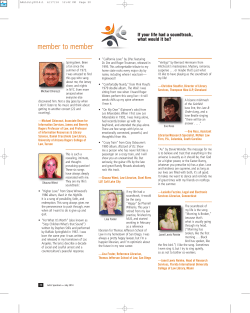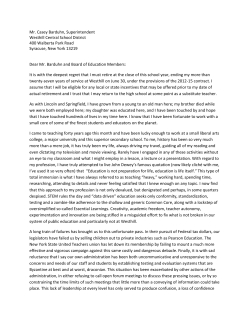
B Lighting a Fire under a How to ignite law librarians’ c
AALLSpectrum_Feb 1/13/06 8:45 AM Page 24 Lighting a Fire under a How to ignite law librarians’ c B y the next decade, law librarians who look to their right and look to their left may find the seats next to them empty. As the year 2015 approaches, a large percentage of us will be near retirement. Nonetheless, we still don’t have enough new librarians entering the profession to offset these inevitable departures. In fact, the U.S. Bureau of Labor Statistics and the American Library Association project that in less than 10 years, library technicians and library assistants’ job growth will outpace the number of professional librarians’ positions. 24 AALL Spectrum February 2006 © 2006 Ellie Slade AALLSpectrum_Feb 1/13/06 8:46 AM Page 25 a Bushel s’ compensation, recruitment, and job satisfaction If we want to reverse this trend and attract future candidates to this career path, we have to aggressively promote the profession and our services through multifaceted public relations campaigns, active recruiting, and targeted media efforts. In short, now is the time to wage a war for our career’s survival, services, and salaries. Questioning Compensation Unfortunately, many law librarians spend their entire careers in a sluggish, pear-shaped organizational structure that does not remunerate them based on their educational credentials, experience, and professional capabilities. According to the 2003 AALL/Altman Weil Compensation Satisfaction Survey, “83.8 percent of the survey participants thought that current levels of compensation in the law librarian profession may inhibit some individuals from seeking the necessary education to enter the profession.” The survey’s results also revealed mixed levels of salary satisfaction among the participants. Nearly 65 percent of the surveyed law librarians responded that they thought “their salary was low relative to other professionals with the same or similar education level.” In addition, only “59.1 percent of the survey participants thought that their compensation was ‘satisfactory.’” The dissatisfaction and frustration some librarians feel about their compensation was articulated at the 2003 Annual Meeting’s Compensation Session Program. On one hand, the speakers stated that a high percentage of the librarian participants in the Altman Survey thought their salary was “satisfactory,” even though they knew that their compensation was much lower than other similar professions and would deter recruitment. On the other hand, the speakers further explained that librarians’ supposed acceptance of substandard compensation may be due to a chronic psychological malady called “depressed entitlement effect,” a term coined in a Yale study in which female employees were found to place a value on their compensation that was 18 percent lower than men competing for the same position. Pink-Collar Profession Within this limited mindset, it was explained that law librarians, as part of a female-dominated profession, might wish they could be compensated with a professional wage, but in fact harbored the belief that they were not entitled to a better salary due to low professional self-esteem and a second-class notion of altruistic service. This low professional self worth historically arose from a traditionally femaledominant (or pink-collar) profession, where librarians were perceived as clerical workers and the physical custodians of books. While many of the directorships of law libraries were held by males before the 1970s and 1980s, the majority of librarian staff members were female. “The pink-collar self perception librarians hold has been incubated and perpetuated over generations, and as a result many librarians have accepted and integrated these negative beliefs as their own,” says Katherine Rosin, librarian at Shook Hardy Bacon LLP in Miami and South Florida Association of Law Libraries (SFALL) president. “To counteract this long-entrenched negative view of the profession, it is necessary for individuals and library associations to spark interest in the law library profession by promoting value of our services, competencies, and education to the legal profession, our employers, and the public.” Comparisons between law librarians’ salaries and other special librarians’ compensation is equally troubling and perplexing. The 2003 AALL Biennial Salary Survey showed that the mean salary for a law librarian with a JD and/or MLS is $53,600. Alternatively, the 2003 Special Libraries Association Salary Survey’s mean salary for a librarian with an MLS is $61,522. Thus, when contrasting the two associations’ salary surveys, the question becomes obvious: Why do law librarians get paid less than special librarians? Again the Altman/Weil Salary Survey gives us a hint by stating that the 47.2 percent of the surveyed participants believed that “the most significant barrier to by Ellie Slade increased compensation is [that] the law profession fails to recognize the contribution of law librarians to the organization.” Butler v. Master If the law profession’s failure to recognize the value of librarians and library services combines with the “quiet profession’s” socalled depressed entitlement effect, law librarians may be permanently shelved in a pink-collar nightmare, based on our silent surrender to the status quo—unless critical action is taken to reverse the situation. If the public perception exists that we are clerical workers, then naturally librarians will be compensated as clerical workers. This stereotypical pink-collar image, endemic to teaching, nursing, and librarianship, has been tied around our ankles like old sand bags. It has severely weighed down our ability to engage in serious pay-equity discussions with our employers, as well as tarnished our professional image and standing. Nancy Brown, law librarian at Wendel Rosen Black Dean LLP in Oakland, notes the effect of librarians’ weak professional self-image on law-lib. “[When] we librarians assume a chronic posture of service, like butlers, people can mistake that for incompetence or a soft center,” she writes. “Sometimes patrons need to be reminded that we are the stealthy Indian guides of the information wilderness and we ought to be trusted and listened to.” In other words, law librarians ought to remove the butler’s towel from their arm and instead assume the role of the self-motivated master and manager of legal information. Unfortunately, the profession’s collective clerical persona can influence corporate managers and law firms to pick non-degreed support staff, without a master’s or sometimes even a bachelor’s degree, to assume professional librarian jobs at a low salary. Of course, companies and law firms get a bad bargain in making such poor hiring choices. Other incarnations of diminished hiring/promoting of professional law librarian positions may include squeezing AALL Spectrum February 2006 25 AALLSpectrum_Feb 1/13/06 11:34 AM Page 26 case of large institutions such as universities.” Schwartz also believes that “in the future, law firm librarian jobs will no longer exist, but will shift and merge with information technology disciplines, as well as knowledge management areas.” Narcissistic Bosses and Substandard Salaries full-time librarian positions into 35-hour, part-time jobs without benefits or morphing the head law firm librarian position into three management positions (including records and docketing) for one low-paid librarian salary, without extra compensation, under the guise of “information resource manager.” Whenever a professional law firm librarian position is diminished, or expanded, it is incumbent upon us to educate our managers, future employers, and the legal community about the value of our work and services. Mark Estes, director of library services at Holme Roberts Owen LLP and former AALL president, comments about the need for law firm librarians to quantify their contribution to the firm. “Law librarians research more efficiently than almost all associates assigned to do research,” he says. “But if it’s not recorded and reported, then no one appreciates the contribution.” Estes further adds, “Law librarians must record their time for billable and non-billable activity so that (1) their time appears on the pre-bill and (2) activities can be reported to management. The pre-bill informs the billing partner of the librarian’s role in servicing the client. The periodic report to management informs the COO or ED of the value-added activities of the library. … Thus, it is imperative that librarians always go beyond the basic request to add value and surprise and delight the requesting attorney,” he comments. Although law school libraries will still employ librarians for years to come, many of us outside of academia may find that our jobs have been eliminated because of the lack of understanding regarding the value of our services to our employers. In fact, Deborah Schwarz, president and CEO of Library Associates, a librarian and information professional recruitment agency, remarked recently that “traditional librarians may cease to exist, except in the 26 AALL Spectrum February 2006 Going further, the flip side of the lowsalaried and undervalued law librarian is the narcissistic lawyer (or library director), who holds court at the pinnacle of the compensation pyramid. The negatively entitled librarian and the narcissistic boss have fused into a sticky, symbiotic employment relationship, which has institutionalized low wages in our profession for years. Under the auspices of power and prestige, the narcissistic boss imagines that he or she is entitled to special treatment based upon his or her own imagined brilliance, success, and power. This type of manager often overworks his or her employees and uses other people’s work without giving individual recognition. (For more information, read “Narcissistic Entitlement Syndrome” by A. Harrison Barnes, Esq., at www.bcgsearch.com/crc/ narcissistic_entitlement_syndrome.pdf.) Unfortunately, some librarians, like hostages or victims of the Stockholm Syndrome, may support a narcissistic boss’ low library salary assignment in order to survive in a power-stratified workplace. But in reality, when law librarians do not negotiate for professional wages, they submit to a second-class salary structure that imprisons the rest of us, as well as future generations. For example, when a prospective job applicant is offered a ridiculously low salary, as in, “How does $30,000 sound?” the law librarian interviewee might counter-reply the low ball offer with, “It sounds just okay, but $60,000 sounds a whole lot better.” As the San Diego Area Law Libraries (SANDALL) employment chairperson, I am often asked to advertise librarian openings that pay less than $40,000 and ask for a master’s degree with substantial online research expertise. This is below a starting legal secretary’s salary in California, a position that requires no prior experience or a master’s degree. Another recent employment trend I have observed are law firms (or companies) seeking “competitive intelligence” or “business research analyst” applicants—that are really acting as online librarians—for low salaries. Here, employers seek job applicants with all the sophisticated skills of an experienced law or business librarian, but the job description states that “candidates need only have a bachelor’s degree with one or two years of work experience.” When law librarians accept these types of positions, the ripple effect of negative entitlement, low self-esteem, and the pink-collar nightmare splashes over the entire profession. Again, it perpetuates the public relations disaster that law librarians are not professionals who deserve (or need) to be compensated based on their education, expertise, and experience, but are “lawyers-light,” or clerical workers. Debra Denslaw, reference librarian at the Indiana University School of Law Library at Indianapolis, recommends that “law librarians should lobby hard to be recognized and compensated for the work we actually do. We assist professors and law students in substantive courses and with their legal writing/research. We manage, find, evaluate, compile, disseminate, and promote information from an amazingly diverse range of sources. We design Web sites and intranets, as well as other online tools. We manage people and responsibilities. ... From a business perspective, what would it cost to hire to meet all of these objectives?” Law schools get quite a bargain in the law librarian employee. This is especially true when academic law libraries require a JD and an MLS for a reference position. These combined degrees may cost as much as $150,000 in graduate school tuitions. Unfortunately, academic reference positions are not remunerated on a similar compensation level as law professors, even though these librarians may teach classes, publish articles, and design Web sites. Salary Negotiation Regrettably, during the recent recession, it has been an employer’s market, with a surplus of over-qualified applicants. Employers have gotten away with paying lower salaries because people feel lucky just to have a job. Because of this, some applicants have accepted low salaries in exchange for fringe benefits, such as health insurance and retirement accounts or pensions. Nonetheless, it is incumbent upon law librarians when faced with low-salaried job offers in a tight job market to negotiate a fair compensation within their geographic market. Although employers will typically want to pay the lowest market price for a new hire, law librarians should remember that salary negotiation is a two-way street. AALLSpectrum_Feb 1/13/06 11:35 AM Page 27 When an applicant receives a job offer, the burden is on the applicant to keep the compensation conversation going, backed up by at least one professional salary survey. Besides salary surveys, a prospective law librarian job candidate may want to consider the ratio of an attorney’s (and/or a law professor’s) salary to a librarian’s salary within the organization. By utilizing the American Lawyer’s 100 Survey, or related law management newsletters, such as the Institute of Management and Administration (IOMA) or the Association of American Law Schools (AALS) publications, the investigative job applicant can likely get a good approximation of these salaries. A note of caution: If the salary ratio of an attorney to a law librarian seems inordinately high, the law librarians should realize that the compensation ratio of an average CEO compared to an average worker has spiraled up to a staggering 240 to one in 2005. If this exorbitant rate of CEO salaries were to continue growing exponentially, corporate salary schedules might begin to look more like a Ponzi scheme than a graduated pay scale. Market, Market, Market By better marketing law librarians’ services, we can expect to receive greater recognition from the legal profession in terms of compensation. “Librarians need to move from a warehouse mentality to a service mentality,” says Al Podboy, director of libraries at Baker Hostetler LLP in Ohio. “While the library may no longer be the central gathering space that it once was in the firm, it can be a nexus for information.” By advertising our services, we can motivate our own membership, future recruits, and employers to create, as well as sustain, professional library positions based on our education, experience, and expertise. It is no longer acceptable for us to hide our light under the legal profession’s bushel. The legacy of our leadership is to pass the torch on a well-lit career path that leads to professional compensation, growth, and recognition for future law librarians. ■ Ellie H. Slade (Eslade2@san.rr.com) is reference law librarian at Escondido Public Library and SANDALL president and employment chairperson. She is also working on a Human Resource Management Certificate at the University of San Diego. Katherine Rosin (KRosin@SHB.com), librarian at Shook Hardy Bacon LLP in Miami, also contributed to this article. How to Raise the Law Librarian Profile To offset the current trend toward low wages and recognition in the legal profession, law librarians must embark on aggressive marketing and public relations efforts. • Publish local chapter salary surveys based on the geographic market, educational, and experience rankings of members. Alternate the chapter survey every two years with the AALL Biennial Salary Survey. • Local AALL chapters should meet with local chapters of the Association of Legal Administrators (ALA) to promote compensation information regarding the profession. Nancy Adams’s article in the Fall 1999 issue of PLL Perspectives addresses how NOCALL members met with the local ALA chapter regarding law librarians’ compensation (www.aallnet.org/sis/pllsis/newslett/fall1999.pdf). • Check with the AALL Economic Status of Law Librarianship Committee (www.aallnet.org/committee/econ_status.asp#charge), which is dedicated to studying compensation, marketing, and promotion of the profession. The committee has a bibliography of resource materials related to compensation issues. It will also develop a best practices strategy regarding the improvement of law librarians’ compensation for each of the different AALL divisions, including academic, private, government/court, corporate, and others. • Give lunchtime presentations to law office managers that promote and market law librarianship. • Display the AALL “How to Hire a Law Librarian” resource guide at annual conferences of legal administrators, legal technology conferences, colleges, and state or county bar associations. • Job seekers may also want to bring “How to Hire a Law Librarian” and AALL’s “Core Competencies of Law Librarianship” when the applicant goes on a job interview for a newly created position. • At law firms, law librarians should provide a return on investment (ROI) accountability analysis that includes detailed cost-recovery information, including librarian billable and administrative hours, as well as budget cost savings related to collection management. • Keep an ongoing file of favorable articles that promote the profession to be used by law firm librarians at review time or by the local AALL chapter employment and public relations chairpersons. • Conduct an internal library staff survey to evaluate overall job satisfaction to retain staff. • Stress the AALL law librarian core competencies and display them with other AALL publications, such as the Law Librarians: Making Information Work, PLL-SIS Resource Guide Series. • Promote professional development, sponsor student scholarships, and give library/law school credits for attendance at the Annual Meeting. • Arrange for joint librarian associations professional meetings, such as AALL and Special Libraries Association. • Write articles in non-law library publications and provide information on the law librarianship career path to college campus advisors. • Train and speak to paralegals, legal secretaries, and related support staff about library orientation and the value of the law library in your organization. They can be some of your best allies and broadcasters. • Create user-friendly law library brochures that advertise the law librarian’s services, credentials, and collection. AALL Spectrum February 2006 27
© Copyright 2025













